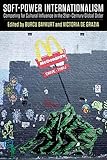Soft-power internationalism competing for cultural influence in the 21st-century global order edited by Burcu Baykurt and Victoria de Grazia
Material type: TextDescription: 1 online resource (viii, 338 pages) illustrationsContent type:
TextDescription: 1 online resource (viii, 338 pages) illustrationsContent type: - text
- computer
- online resource
- 9780231551335
- JZ1312 .S648 2021
- COPYRIGHT NOT covered - Click this link to request copyright permission: https://lib.ciu.edu/copyright-request-form
| Item type | Current library | Collection | Call number | URL | Status | Date due | Barcode | |
|---|---|---|---|---|---|---|---|---|
 Online Book (LOGIN USING YOUR MY CIU LOGIN AND PASSWORD)
Online Book (LOGIN USING YOUR MY CIU LOGIN AND PASSWORD)
|
G. Allen Fleece Library ONLINE | Non-fiction | JZ1312 (Browse shelf(Opens below)) | Link to resource | Available | on1196821053 |
Intro -- Table of Contents -- Acknowledgments -- Introduction: Soft-Power Internationalism, by Burcu Baykurt and Victoria de Grazia -- Part 1: Historical and Conceptual Foundations of Soft-Power Internationalism -- 1. Soft-Power U.S. Versus Normative Power EU: Competing Ideals of Hegemony in the Post-Cold War West, 1990-2015, by Victoria de Grazia -- 2. Circulating Liberalism: The Global Internet and the Rise of Soft-Power Internationalism, by Burcu Baykurt -- Part 2: Turkey
3. Turkey's "Soft Power": A Conceptual Overreach and a Conversation in Multiple Concepts, by Dilek Barlas and Lerna Yanık -- 4. Turkey as "Trading State": The High Hopes for Commerce from the Boom Years to the Arab Spring, by Mustafa Kutlay -- Part 3: Brazil -- 5. Bridge Builder, Humanitarian Donor, Reformer of Global Order: Brazilian Narratives of Soft Power Before Bolsonaro, by Oliver Stuenkel -- 6. Lula's Assertive Foreign Policy: Soft Power or Dependency?, by Fernando Santomauro and Jean Tible -- Part 4: China
7. China's Soft Power in Africa: Promoting Alternative Perspectives, by Martina Bassan -- 8. The Evolution of China's Soft-Power Quest from the Late 1980s to the 2010s, by Zhongying Pang -- 9. Global China and Symbolic Power in the Era of the Belt and Road, by Anastas Vangeli -- Part 5: Euro-Atlantic Perspectives -- 10. The End or the Beginning of Normative Power Europe? Transcendence and the Crisis of European Foreign Policy, by Thomas Diez -- 11. Is There a Coherent Ideology of Illiberal Modernity, and Is It a Source of Soft Power?, by Jack Snyder
Power, Culture, and Hegemony: A Selected Bibliography -- Contributors -- Index
"The term "soft power" was coined in 1990 to foreground a capacity in statecraft analogous to military might and economic coercion: getting others to want what you want. Emphasizing the magnetism of values, culture, and communication, this concept promised a future in which cultural institutes, development aid, public diplomacy, and trade policies replaced nuclear standoffs. From its origins in an attempt to envision a United States-led liberal international order for a post-Cold War world, it soon made its way to the foreign policy toolkits of emerging powers looking to project their own influence. This book is a global comparative history of how soft power came to define the interregnum between the celebration of global capitalism in the 1990s and the recent resurgence of nationalism and authoritarianism. It brings together case studies from the European Union, China, Brazil, Turkey, and the United States, examining the genealogy of soft power in the Euro-Atlantic and its evolution in the hands of other states seeking to counter U.S. hegemony by nonmilitaristic means. Contributors detail how global and regional powers created a variety of new ways of conducting foreign policy, sometimes to build new solidarities outside Western colonial legacies and sometimes with more self-interested purposes. Offering a critical history of soft power as an intellectual project as well as a diplomatic practice, Soft-Power Internationalism provides new perspectives on the potential and limits of a multilateral liberal global order"--
COPYRIGHT NOT covered - Click this link to request copyright permission:
There are no comments on this title.
